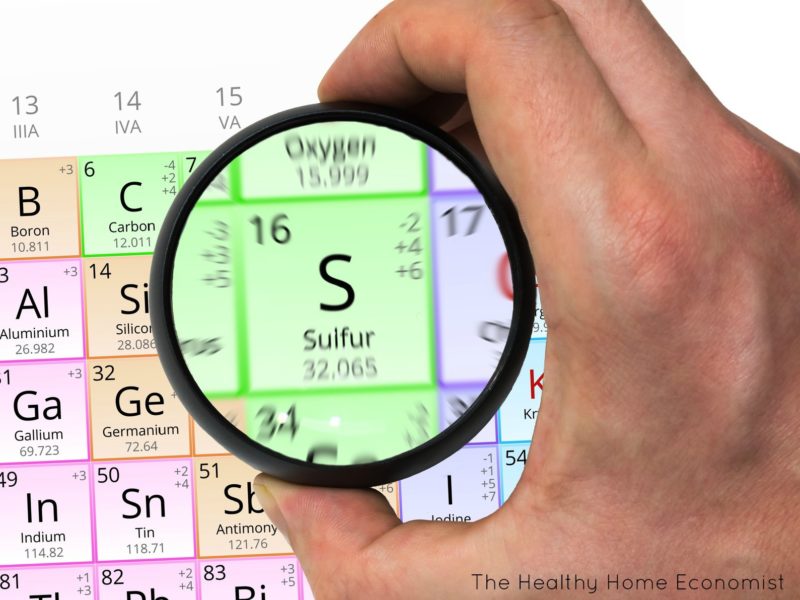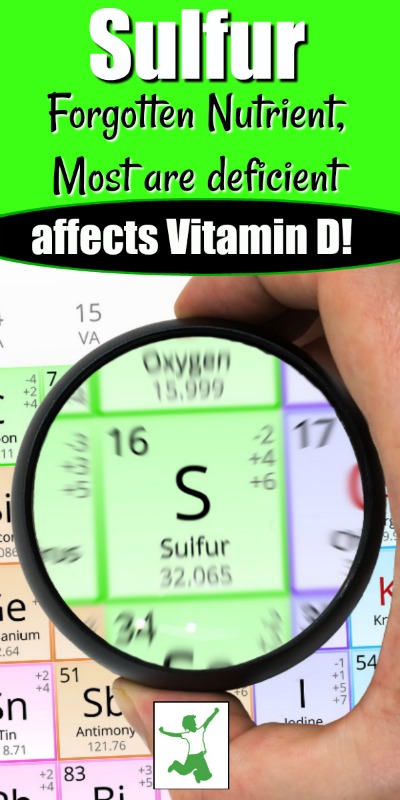How sulfur deficiency may contribute to the inability to raise Vitamin D levels and chronic diseases like dementia. Where to get this critical nutrient naturally in whole foods to help support natural detoxification via the body’s elimination pathways.
A neighbor of mine who is in his 70’s, looks 50, and still does triathlons once told me that his mother used to make him drink well water. He hated it because it stunk to high heaven of rotten eggs! That rotten egg smell is, of course, hard water with high amounts of sulfur in it. She told him that it would boost his immune system and keep him healthy.
Smart lady.
Unfortunately, sulfur, also spelled sulphur, is all but forgotten as a critical nutrient in recent decades. Yet, this important element is very necessary for the maintenance of health. Moreover, it is important for the prevention of debilitating illnesses such as Metabolic Syndrome and perhaps Alzheimer’s.
Shockingly, a Minimum Daily Requirement (MDR) to avoid sulfur deficiency does not even exist! This despite the fact that this mineral is the eighth most common element by mass in the human body.
Countries With High Sulfur Intake Are Some of the Healthiest
The countries of Greece, Italy, and Japan are the primary suppliers of sulphur to the rest of the world. Isn’t it coincidental that these same countries enjoy some of the lowest rates of heart disease and obesity on the planet?
Perhaps not. Icelanders’ remarkably low rates of depression, obesity, diabetes, and heart disease can possibly be attributed to the country’s distinctive line of volcanoes. Periodic eruptions blanket the soil with sulphur containing volcanic rock. This enriched soil is of tremendous benefit to any plants grown or animals grazing there. In turn, people who use these plants and livestock for food enjoy greatly enhanced health.
It was once thought that the Icelandic diet was so protective against chronic illness due to a high intake of fish. This theory does not hold up, however, as Icelanders who move to Canada and continue eating a lot of fish do not continue to enjoy the same low rates of disease.
It seems that the Icelandic soil which is unusually rich in sulphur may indeed play a pivotal role in the health and avoidance of sulfur deficiency of its residents.
Sulphur’s Critical Role in the Body
Sulphur is critical to many of the body’s biological processes, metabolism included.
Without adequate sulphur, glucose metabolism becomes defective. This leads to muscle and fat cell damage as the result of becoming glucose intolerant. Over time, sulphur deficiency can lead to all manner of skeletal and muscle disorders with corresponding pain and inflammation.
This impaired glucose metabolism resulting from insufficient sulphur is also implicated as a factor in obesity and the dangerous condition known as Metabolic Syndrome. This occurs because one way the body compensates for defective glucose metabolism is by gaining weight.
When sulphur deficiency occurs within the context of a lowfat diet, the problem becomes more serious. Additional sources of glucose present in a lowfat diet in the form of carbohydrates are converted to fat. Worse, these lipids are released into the bloodstream as triglycerides to fuel damaged and inflamed muscle cells.
Alzheimer’s Disease Partly Due to Sulfur Deficiency?
Analysis of the minerals present in the cells of the typical Alzheimer’s patient reveals that sulphur is almost nonexistent compared with a normal profile.
Some research has indicated that the reversal of a serious sulphur deficiency state can prevent or halt the progression of this disease. In addition, it may potentially reverse it provided the patient is still in the early stages where little brain damage has occurred. Coconut oil for Alzheimer’s has shown promise as well.
Could the skyrocketing cases of Alzheimer’s in recent years be related to the shunning of eggs by older Americans? Eggs are an excellent source of sulfur! Yet, in adult living facilities and nursing homes, egg replacements like Egg Beaters are commonly used instead.
Sulphur Helps Mobilize Vitamin D from the Sun?
When unprotected skin is exposed to the sun, the skin synthesizes vitamin D3 sulfate. While vitamin D is fat-soluble, vitamin D3 sulfate is a form of the vitamin that is actually water-soluble. This allows it to travel freely in the blood throughout the body.
On a side note, the vitamin D3 in supplements is not the same vitamin D3 as what you get from the sun and should not be considered an adequate substitute.
Sunlight exposed skin also produces large amounts of cholesterol sulfate, providing cholesterol levels are sufficient for this to happen.
The sun, then, has the potential to provide sulfur to the body in the form of vitamin D3 sulfate and cholesterol sulfate.
Could undiagnosed sulfur deficiency and/or insufficient natural cholesterol in the diet be contributing to the epidemic of undiagnosed Vitamin D deficiency?

Make Sure You Get Enough to Avoid Sulphur Deficiency!
It is quite shocking that sulfur is basically ignored in nutritional circles. Nonetheless, it is a critical nutrient and one that is necessary for vibrant health and prevention of chronic disease.
One very simple way to improve the body’s sulfur status quickly is through regular Epsom salt baths. 2-3 per week soaking for 20 minutes is a sensible regimen. Epsom salt is comprised of magnesium sulfate, and both magnesium and sulfur absorb readily into the body via the skin. One caveat: Be sure to buy USP certified Epsom salts. Avoid lower quality agricultural grades.
With regard to dietary sources, another excellent way to ensure you get enough is to eat more eggs! The incredible edible egg contains high amounts of natural sulfur. Eggs also supply natural cholesterol to ensure enough is available to mobilize sulfur combined with Vitamin D in the blood. Other foods high in this element include onions, garlic, and cabbage.
Do not rely on dried fruit treated with sulfur dioxide. This is not a healthy source of sulfur!
Another caveat to note is that while certain plant foods should contain lots of sulphur, it is likely the amounts are low. Why? Sulfur rich produce is dependent upon cultivation in sulfur-rich soil.
Most soils today are depleted of this critical nutrient (unless of volcanic origin or organically treated with azomite volcanic rock dust). Thus, unless you are sure about where your vegetables are grown, relying on eggs for adequate sulfur in the diet is the decidedly better way to go!
Reference
A Possible Contributing Factor in Obesity, Heart Disease, Alzheimer’s and Chronic Fatigue








@Dawn, where can one get a zinc and sulfur cream? i use sulfur homeopathic tabs and that helps my skin breakouts.
My husband’s family owned and ran a small general store in a rural community in the 70’s and 80’s and they always carried powdered sulfur, a very popular remedy. I began taking sulfur a month ago for chronic back pain and it has been a tremendous help. It is widely available in products for joint pain and for building healthy cartilige.
My husband’s family owned and ran a small general store in a rural community in the 70’s and 80’s and they always carried powdered sulfur, a very popular remedy. I began taking sulfur a month ago for chronic back pain and it has been a tremendous help. It is widely available in products for joint pain and for building healthy cartilige.
So how much sulfur is in an average free-range egg, or will that depend upon the locality and diet of the chicken?
Chickens that are free to peck for insects and grubs should produce eggs higher in sulphur than chickens eating soy and grains from depleted soils.
Sulfur is also great for wrinkles, nails and hair!!!
Personally, I am currently taking MSM powder, which is a great source of sulfur to prepare my body to replace amalgalm fillings. According to Dr. Mercola, it helps with mercury detox. And while I realize MSM is chemically produced, for short term heavy metal detox and other problems it should be fine.
My son is currently sensitive to eggs (hoping to be able to reintroduce them some day). Is sunlight what you recommend? Trying to figure out how much/how to do it b/c he is very fair and easily burns….
Hi Heather, red meat is also high in sulphur containing amino acids.
My 1 year old daughter is also very fair and I’ve had her bare skin in the sun several times now, she’s only burnt a tiny bit one time. The key is to watch for the skin to start turning pink because that is the limit for vitamin D production for the day as well as the brink of burning. It’ll be about 15-20 minutes of direct sun. Granted I’m also in the NW so if you’re further south, it might be shorter.
well tina if you showered or bathed in it it would absorb in the skin
Is there a good supplement for sulfur? Or maybe a good cream?
Hi Tina. I found MSM powder to be great. It does have a bitter taste but I am currently taking it for mercury (preparing myself to replace mercury fillings) detox.
Marina, your post caught my attention, my husband just had x-rays done today in preparation to have his mercury fillings removed soon. Can you explain more or give me links to this detox you are referring too? We are fairly new to this more aware healthy living and I am still trying to figure it all out :). Thanks!!
There is also the Angstrom Mineral kind. It is a liquid that is essentially pre-digested into a particle size that fits right into your cell doors. Since it is already broken down it is almost 100% absorbed so you need a smaller dose. I just started using it so was interested to read this article. I bought it becasue I found that I react differently to using mangesium sulfate (epsom salts) in my bath vs. magnesium chloride. So I thought the difference may be that I need more sulfur. Here’s what I’ve been using…
Sulphur: The Forgotten Nutrient – The Healthy Home Economist http://t.co/pKGSU6q #sulphur #Iceland #health
People used to keep sulfur blocks for the cattle.Milk also used to be a good source till they started pasturizing it.
I remember mineral blocks and salt blocks, but not sulphur blocks. The mineral blocks were reddish brown in color and the salt blocks were creamy white and sometimes grayish white in color. It depended on where my Dad bought them, I guess, but it was usually from the Farm Co-op Store because that’s about all we had back then. Our turkeys, chickens and guinea hens used to love pecking away at these, too, whenever the cattle were out to pasture and not up by the stock dams where we kept the blocks. I would guess the mineral blocks contained some sulphur, though. The smell of those blocks used to amaze me because they smelled really clean or pure or something – can’t explain it.